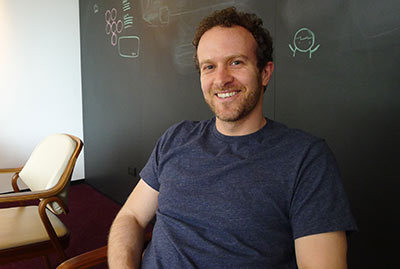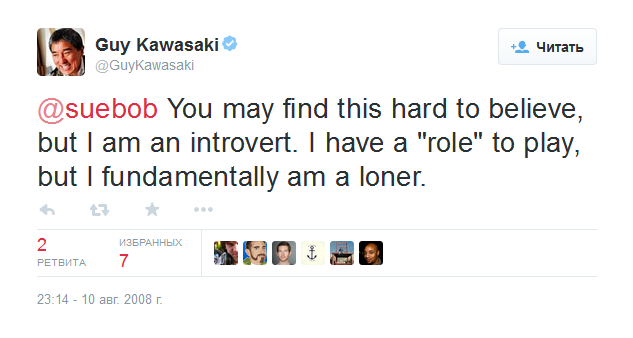Several years ago I worked as a scriptwriter for some training courses. One morning, my chief met me with a face “we need to talk.”
He asked me to see a visiting psychologist. “Thank God, not a psychiatrist,” I thought. As it turned out, he had hired a psychologist who “helped overcome barriers of communication in the team.” For appearance’s sake, the psychologist had a talk with all the staff, though they only viewed the problem in me.
I declined his tempting offer and soon forgot about it allright. But the next week, I met this psychologist again. At first she was sitting on the couch and looking through catalogs. And then she sat next to me with a ‘I’m-here-if-you-need-help’ look. After a while, I got bored and told her what I was thinking of it.

Have you imagined this scene? Yes, exactly like in the movies about some weird people.
After I had been asked to leave, one of my former colleagues told me that the people had not really feared me, but they never knew what was on my mind. The matter was, I had never discussed anything but work, my communication with colleagues was mostly reduced to “good morning” and “see you” if there were no business issues.
And all this was at the time when our chief did his best to create a “stress-free atmosphere”: all (except me) were photographed for the enforced positive posts in the corporate blog, took nature hikes (without me) and discussed films. In these discussions, I felt like at the lesson of literature analyzing a Shakespear’s sonet.
I just didn’t need that, I was interested in work, not socializing. And by the way, in addition to my work, I was doing a whole lot for process optimization and the like — it was a startup, and thus, much had to be done from scratch, that’s what attracted me. So, while all were discussing another film they had just watched in the office, I was doing work.
But even my proactivity did not save me from the dismissal.
 I think, today I understand my boss. I can get into his shoes, “This dude is weird. He kind of does everything he was entrusted, even more. He isn’t lazy, though comes later than others. Rather, on the contrary, he works disturbingly too much. And keeps silent all along… He isn’t engaged in corporate life. Hell, he has never even photographed for the blog! Is he hiding something?”
I think, today I understand my boss. I can get into his shoes, “This dude is weird. He kind of does everything he was entrusted, even more. He isn’t lazy, though comes later than others. Rather, on the contrary, he works disturbingly too much. And keeps silent all along… He isn’t engaged in corporate life. Hell, he has never even photographed for the blog! Is he hiding something?”
At the time, I didn’t know how to behave. Today, after I took a fancy for negotiating and have studied a pile of books on introversion I know what to do and what to say.” That is the end of story.
Disclaimer I: In order to prevent non-constructive debates — I understand that there are very few “pure” extroverts and introverts, but they exist, and a precedent is a good reason for investigation. Besides, you don’t have to be a pure introvert to feel first-hand all the amenities of this world that is not shutting up even for a second.
For a start, let’s review what introverts are not. Of course, theses don’t claim to be scientific, and can provoke accusations of populism, but nevertheless:
7 myths about introverts:
1. Introverts don’t like to talk.
It is not true. Introverts don’t like to chat. They will keep silent until they have something to say. Windbaggery fags them out. But try to talk to an introvert about things he is interested in and it will be difficult to stop him.
2. Introverts are shy.
Shyness is not associated with introversion. Introverts don’t fear people, but they need a solid reason to interact. They are unlikely to liaise with someone only out of politeness or for “mutual friendship” reasons.
3. Introverts are rude and don’t like people.
No, they just see no point in social conventionalities and exchange of false courtesies. They want everything to be a fair play. Unfortunately, that’s not the way the world is. It‘s a lot of stress for them to behave genuinely, which they prefer to avoid.
4. Introverts don’t like to be in public.
That is not so. Introverts don’t like to be long in public. They require less time to collect information and impression, and much more for processing it. And if you think it sounds too utilitarian, then, yes, so it is — they hate aimless kill-time on a one day or a lifetime scale.
5. Introverts are weird.
Most often they are individualists. They are little susceptible to the herd behavior, guided by their inner beliefs. They think independently, so their judgments often discord with the public. From outside such behavior might seem eccentric, extravagant, or even shocking. But еpatage contradicts the very definition of introversion, so еpatage introverts don’t exist. Except Marilyn Manson, perhaps.
6. Introverts are avoidant bores.
They may seem self-absorbed, but that doesn’t mean they take no notice of what is happening around. On the contrary, the same detecting sensors work non-stop. Another thing is, not all of what is happening around, they consider worth attention.
7. Introverts can stop faffing about and behave normally.
No. To expect socialization from them is the same as to ask a turtle to do without its shell.
Science, bitch
Disclaimer II: I realize that fundamentally, life is not binary, but much more diverse. No, I don’t suggest dividing the world in two. No, I’m not stating that “there are two types of people in the world.”
Well, let’s move on to the verifiable categories.
In cognitive neurosciences, the term “temperament” has no universal interpretation. Often it is described as “a distinctive way to respond to extrinsic stimuli.” These reactions are stable, unchangeable, and can be observed soon after birth, and therefore are assumed to be caused genetically.
In these conditions, personality is an inconstant quantity and influenced by parental education, environmental and cultural factors. Temperament affects personality directly, because temperament is genetically based.
Of course, these definitions and theories are disputed to this day, but the first who came to the point empirically, was Professor Jerome Kagan, a pioneer in the field of developmental psychology. Prior to his research, all theories were based only on opinions.
We will not trouble you with a description of experiments, the curious can take a look here.
In the course of the experiments, in which five hundred of four-month-old babies were involved, the Kagan’s group identified two types of behavior — low reactive, when the babies reacted to the stimuli feebly, and highly reactive, when the reaction was clear and continuous.
As the name suggests, one would assume that the babies who burst into tears at the sight of a woman in a gas-mask, will become extroverts in the future. But it turns out exactly the opposite; the research is still going on, and the results give good reason to believe — the highly reactive infants grow into introverted personalities.
Simultaneously with the observations, measurements of physiological parameters were carried out, their results gave reason to believe that highly reactive babies, i.e. future introverted personalities, have a more sensitive amygdaloid body.
Thus, people prone to introversion get more signals, to process which they need a lot more attention, time and energy than extroverts. That’s why it takes the introverts longer time to think than to say. And, unfortunately, to act.
Noise level
 In 2001, the Belgrade Public Health Institute conducted a research. 123 students (43 men and 80 women) were asked to mentally perform some arithmetic operations, in both quiet and noisy laboratory conditions. Proneness to a particular temperament type was assessed by the Eysenck Personality Questionnaire (EPQ).
In 2001, the Belgrade Public Health Institute conducted a research. 123 students (43 men and 80 women) were asked to mentally perform some arithmetic operations, in both quiet and noisy laboratory conditions. Proneness to a particular temperament type was assessed by the Eysenck Personality Questionnaire (EPQ).
Test objects evaluated concentration problems, the level of fatigue and irritation caused by the noise on a 10-point scale.
The group consisting of extroverts coped with the tasks more quickly, being in a noisy environment. Introverts, on the contrary, had problems with concentration, fatigue and irritation in the same conditions.
Correlation analysis revealed a high inverse dependence of extroversion on the noise level.
Strategy
Now that we have found out introversion to be an inherited quality that may hamper a successful career in the world of extroverts, what can we do about it?
An excerpt from the book about introverts:
“Of course, we allow all gifted eccentric loners, building up garage companies, to show their personality as they please, but it is rather an exception to the rule — our tolerance usually applies to those who have managed to grow fabulously rich, or at least, those who show great promise for that.”
Introverts are often perceived as individualists and people who “don’t want to play in the team”, but it’s not all that simple. If you make an introvert “be on the team,” he will spend more energy trying to “fit in” with the team than to really “play”. And it’s not a whim or a drawback, although in the eye of the corporate world it’s very much so.
So, what should a person do, who hates a trash-talk of yesterday’s “Game of Thrones” series and the new model I-Phone?
Unfortunately, here the majority rule is in effect — if you are in England, you have to drive on the left side of the road, no matter how independent-minded you may be.
Thus, the only way out is learning to work on your “weaknesses” and adapt your life cycle to the world of extroverts.
What does this mean in practice?
No matter just how agreeable you are with the concept of polar temperaments, from this research it is clear that introverts can significantly improve their efficiency if they do work in conditions of controlled noise. For extroverts, obviously, the opposite is true. If you’re an extrovert, you are to be congratulated. Introverts are less fortunate, someone will unlikely create special working conditions for them. What is to be done in this case?
Of course, the most obvious solution to the problem of noisy workplace is work from home. But, firstly, many introverts know this very well. And secondly, of course, it is not always possible. Therefore, the only solution will be to create “security islands”.
Many companies are still far from Google’s offices with their EnergyPods, but most probably, in your company there are spots where you’ll be able to stay alone from time to time, like meeting rooms, for instance. Although, this is still a temporary solution, and if you are not the only introvert in your company, it’s probably time to discuss this issue with your bosses. A good boss knows very well how to watch money, and you will not have any problem with the reasoning in favor of rationality in arranging recreation zones.
Just don’t call them “places for rest”, most likely, the execs will not be enthused over this term.
Intrоnet
Here is the opinion of Jason Fried, the founder of 37signals,about the reasons why people choose to work from home:
 “And what you find is that, especially with creative people — designers, programmers, writers, engineers, thinkers — that people really need long stretches of uninterrupted time to get something done. You cannot ask somebody to be creative in 15 minutes and really think about a problem. You might have a quick idea, but to be in deep thought about a problem and really consider a problem carefully, you need long stretches of uninterrupted time.
“And what you find is that, especially with creative people — designers, programmers, writers, engineers, thinkers — that people really need long stretches of uninterrupted time to get something done. You cannot ask somebody to be creative in 15 minutes and really think about a problem. You might have a quick idea, but to be in deep thought about a problem and really consider a problem carefully, you need long stretches of uninterrupted time.
And even though the work day is typically eight hours, how many people here have ever had eight hours to themselves at the office? How about seven hours? Six? Five? Four? When’s the last time you had three hours to yourself at the office? Two hours? One, maybe? Very, very few people actually have long stretches of uninterrupted time at an office. And this is why people choose to do work at home, or they might go to the office, but they might go to the office really early in the day, or late at night when no one’s around, or they stick around after everyone’s left, or go in on the weekends, or they get work done on the plane, in the car or in the train, because there are no distractions.”
And yet, we are not talking about introverts here. Imagine how imperative it is for them. In their case actually, a few more elements are added to the equation: social interactions, the necessity to play a role and others.

Knowing who Guy Kawasaki is, it’s really hard to believe this. But it’s not the only example when a person dedicated his life to banding people together and the efforts turn out “ secluded”.
Craig Newmark, the founder of Craigslist, tells about his problems in communication, and what helped him to cope with them.
In 2002, at Bar-Ilan University, a study was conducted, which revealed that in the first place, introverts communicate on the Internet more freely than extroverts. And secondly, introverts are more open in communicating through the Internet than in “real life”.
This is probably because communication via the Internet relieves from the necessity to observe social rituals, as well as from the stress associated with estimation.
No socio, no ability
The first step in solving a problem is to formulate it. Probably, you don’t see it as a problem. Sure thing, we are talking about temperament, is this a problem at all?
I had thought so too, until that story of the beginning of the article happened to me. And then another story, and one more. Eventually, it came to me at last that the problem existed, and the problem was in me.
It doesn’t matter how well you cope with your work, if you can’t talk about it, preferably, just as well.
When I realized that I felt more comfortable working from home, that is, in a controlled environment, I hired the best agent I could only find. When I watched him “sell” to complete strangers, he seemed a superman to me.
But after working with him for a while, I understood that he made absolutely no difference what to sell, and he had no idea what I do. And was not eager to understand. As a result, he made such concessions and accepted such conditions which practically brought the value of his transactions to nought. I didn’t know how to explain to him that it wasn’t a matter of price, or profit.
So I had three choices: to try again, to find another agent, or to learn how to talk to people.
I decided that at the age of 27 it was right time to be independent, and made the first step — I signed up for negotiating training course. It’s hard to imagine a more unsuitable place for an introvert than a course on customer communication.
It is important to emphasize that I don’t consider Dale Carnegie’s achievements enviable. Clearly, because they are in direct contradiction to my introverted nature. And, at the mention of the book “How to Win Friends and Influence People”, I involuntarily clench my fists.
But it turned out, not all the negotiation systems are based on lies, manipulations and compromises. On the contrary, there are ones that criticize such practices.
A search for like-minded
Of course, an introvert can’t “convert himself” and become a sociable extrovert, no matter how hard he tried. At least, I don’t know of such examples. But he will have to “learn to drive on the right side of the road,” and the sooner he accepts it, the better for him and his career.
We have already written about the advantage of leaving your comfort zone, and to join negotiating classes is an excellent example of this practice, but it doesn’t necessarily have to be the courses. You can start with some smaller goals.

Internet is an ideal environment for cooperation of introverts, and services similar to SmartProgress simplify the associates search process.
You have lots of ideas, but you doubt that you will cope alone? Create a goal there, outline the project and use the “Looking for partner” function. Write about your achievements, you will be distinguished, for sure. My friend found a business partner thanks to SmartProgress. He was just describing his steps, and his future partner saw detailed and well-thought-out posts, that gave an impression of a pedantic person. And it all worked out. He didn’t have to introduce his business to investors, or look for partners on specialized resources, but he simply pursued his goal and his determination was noticed.
Introverts tend to have difficulty to even start looking for like-minded people. Because they don’t know how to present themselves and their project. Or they have previously decided that their ideas will be of no interest to anyone — they are masters of mental estimations. Or they are afraid, someone will say this is a “crazy idea” and confirm their worries.
Ask your introvert friend, he is sure full of unrealized “useless ideas.” Extroverts know the secret — you should share ideas, and they share. Sometimes, even with those who didn’t ask for. Introverts find such behavior unacceptable, and any publicity for them is akin to showing off which they can’t tolerate. So, introverts just need an extrovert business partner.
At that, it’s not necessary to sacrifice sincerity — you are not able to keep up a “weather” conversation — you don’t have to, I can’t either. Although, some even write books on the subject, and some even read them.
Introversion and publicity
So far, it is felt that there’s nothing introverts can do in the areas which involve “work with people”. Is it really so? Can introvert be a successful orator, politician, entrepreneur, film producer — in other words, the person who spends most of the time in contact with people?
The short answer is “yes”. And the longer one — “yes, but…”
 Bill Gates, Elon Musk, Abraham Lincoln, Warren Buffett, Mark Zuckerberg, Guy Kawasaki — if this list doesn’t convince you, I’ve got a few more arguments. Introverts are not only able to manage companies and individuals, but often do it better than extroverts. This has at least two explanations.
Bill Gates, Elon Musk, Abraham Lincoln, Warren Buffett, Mark Zuckerberg, Guy Kawasaki — if this list doesn’t convince you, I’ve got a few more arguments. Introverts are not only able to manage companies and individuals, but often do it better than extroverts. This has at least two explanations.
First, thanks to their cast of mind, it is important for introverts to solve problems and achieve results, without paying attention to their ego. They don’t care if you have done their task, it is important you got the task done.
Second, introverts are aware of their weaknesses from an early age, so they spend more time on training, education and practicing managerial and communication skills.
Elon Musk about how he learned not to seem introverted.
We are used to imagine leaders just as active, sociable and charismatic “energizers”. But this is only because in the culture these types of leaders are paid more attention.
Jim Collins, in his famous book “Good to Great”, didn’t consider the question of extra- or introversion of “level five leaders”, but always ran into the same thing — the personality of executive managers. And among them there were surprisingly few people who spent money on expensive cars, yachts and other trappings, and their description featured the words “modest”, “composed”, “non-public”.
You can refer to this information as unconfirmed rumors or myths, but in my opinion the correlation is more than obvious — introverts don’t care about self-esteem or image, while in an extrovert’s life ego plays a significant role.
Of course, image is important for business and manners are important for business negotiations, because, as we know, even the most intelligent people make decisions guided by emotions. Since the deal is done, no one cares any longer what you are wearing or in which car you have arrived at the meeting. From this point on, the only thing is important. The result, of course.
Stay with me
 I hope you’ve read until here. It wasn’t my aim to retell the book “Quiet”, but just like many of you, I’m an opponent of simplifications and I have a lot of claims to this book. Nevertheless, the book has helped me to formulate the problem, which I tried not to notice before. The book makes you think that we can’t control everything, no matter how badly we would want it.
I hope you’ve read until here. It wasn’t my aim to retell the book “Quiet”, but just like many of you, I’m an opponent of simplifications and I have a lot of claims to this book. Nevertheless, the book has helped me to formulate the problem, which I tried not to notice before. The book makes you think that we can’t control everything, no matter how badly we would want it.
You can’t just close your eyes to the inconveniences that the diversity of life creates, to pretend that there is no problem. Sooner or later, you will realize that you are driving on the wrong side of the road, and if you ask me — in my opinion, you’d better understand it before an accident.
I haven’t learned, and will unlikely learn to keep up an idle conversation. Not least because, I never feel when it is “enough”, and we can finally get down to business.
I’m unlikely going to demand from the world of extroverts to take my specific traits into account. But I can arrange my work so that I had time to recharge.
One of the tips given to the introverts from the book was to learn to consciously sacrifice their comfort for the benefit of the results. Yes, after socializing with people, introverts need time out to recover. But you have to be able to communicate with people, if you want to achieve something.
If at work you need to communicate with people on the phone, of course, you can entrust it to someone else. So I did before. But then I realized that it was an escape from the problem, not the solution. Now I’ve found my own way to do it — I answer my calls standing. I don’t know why, but it works.
Knowing the problem, you can come up with a solution, even if it looks silly from outside. Turning away from the problem, you may not notice how it will grow to such an extent when it would be difficult to get it under control.

 Русский
Русский









